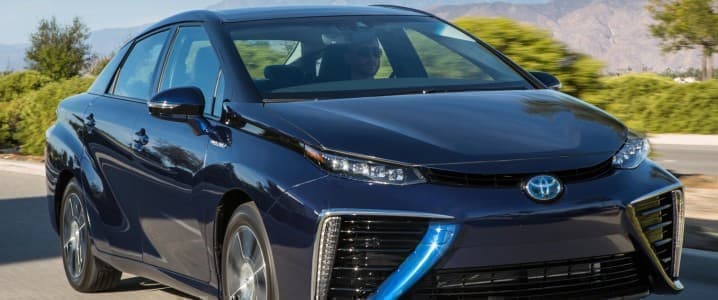A tax credit of $8,000 for buyers of fuel cell cars in the United States is set to expire at the end of the year in what would be a major setback for a technology that never really caught on. It will now become even harder for fuel cell car makers to sell their product in one of the biggest car markets in the world. According to a report from CarsDirect, the federal tax credit, which covers cars manufactured in the past three years, will deal a major blow to Toyota, which is just preparing for the launch of its new fuel cell passenger car, the Mirai, next year. At the same time, the report argues, the expiry of the tax credit will strengthen the upper hand of EVs over fuel cell vehicles.
Truth be told, there was never much of a competition between electric cars and fuel cell cars. The latter simply never really took off the way the former did. While emission-free, fuel cell technology is quite expensive and has not made the huge cost-lowering strides that EV technology has experienced.
Fuel cell technology does have its advantages over current EV technology, however, or rather, one advantage but a major one. Fuel cell cars charge much, much faster than their battery electric cousins because they charge with hydrogen, which is then used in the engine to produce electricity, which powers the car. There is no range anxiety with fuel cell cars. But there are drawbacks.
The main one is that hydrogen is a dangerous element to store, and there is a serious risk of explosions even with precautions. Other than that, the only problems fuel cell cars seem to have is their price and the lack of a big enough charging station network.
Related: The Biggest Energy Bill In A Decade Was Just Passed
"We are an early market and these cars are not cheap for lease or sale," Keith Malone from the California Fuel Cell Partnership told ABC News earlier this month. "Most stations are concentrated in urban areas in California. But we've seen a lot of progress. The real challenge is rolling out the fueling network. But the vehicles are here. They're good, people love them."
California is currently the only state in the U.S. where fuel cell cars are sold. According to the ABC News report, since the launch of the original Toyota Mirai in 2015, more than 6,500 have been sold in California. That's out of total fuel cell car sales of 8,890, according to the California Fuel Cell Partnership. That's less than what Californians buy in EVs on a monthly basis.
Despite proponents' best efforts, fuel cell cars are not getting enough help from regulators. Apparently, the fuel cell technology lobby is much weaker than the EDV lobby. And yet, hydrogen cars may yet have a future in California, at least.
Earlier this year, Governor Gavin Newsom signed an executive order that would make the sales of new gasoline and diesel cars illegal from 2035 onwards as part of its ambitions to become a net-zero state. The news was immediately bullish for EVs, but there is no reason why it shouldn't be bullish for fuel cell cars, too, at least potentially.
Indeed, an obligatory switch to net-zero emission vehicles seems the only way to provide some sustainable future to fuel cell car technology, especially if it is coupled with more efforts to reduce the price of the end product. The 2020 Mirai, for instance, starts at $59,545, according to CarsDirect. California offers a Clean Vehicle Rebate to the tune of $4,500, which will lower the Mirai's price to some $55,000. That's compared with $40,000 for a base Model 3. Fuel cell technology needs more regulatory help to take off.
By Irina Slav for Oilprice.com
More Top Reads From Oilprice.com:
- Could This Be The Top Oil Play For 2021?
- How Electric Vehicle Hype Created A Brand New Trillion Dollar Market
- China And Iran Start Drilling In This Super Giant Gas Field



















Fuel cell powered buses by way of example have been part of the US transit system for some time now.
Anyhow nothing says "we're humans" more than a debt based monetary system that can only be put paid one way namely by printing mo money.